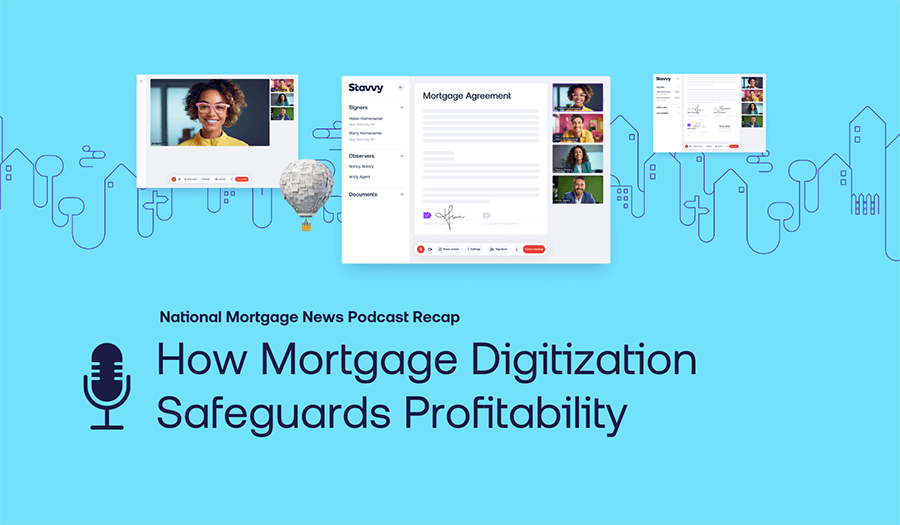On March 30, 2023, Massachusetts remote online notarization legislation passed with a historic bill that protects the role of a closing attorney in a real estate transaction.
Naturally, we were curious to uncover what this transformative milestone may mean for the real estate, title, and mortgage industries. And who better to shed light on this topic than two of our industry experts—Stavvy’s CEO and Founder, Kosta Ligris, and VP of Industry and Regulatory Affairs, Angel Hernandez?
Kosta Ligris has over 20 years of title industry experience and expertise. After leading two successful title companies, Ligris and ACES Title Agency, in 2018, Kosta founded Stavvy, a digital real estate platform to help title companies, lenders, attorneys, and servicers close and oversee real estate transactions more efficiently with technology instead of relying on disjointed paper-dependent processes.
Angel Hernandez has built a career in the mortgage industry with Ginnie Mae, the Housing Policy Council, and the US Department of Housing and Urban Development (HUD).
Kosta and Angel spoke candidly about the passing of Massachusetts remote online notarization legislation and the ripple effect it may have beyond the Commonwealth.
When does Massachusetts remote online notarization legislation go into effect?
As part of a supplemental budget for the fiscal year 2023, Massachusetts Governor Maura Healy signed amendments to the Massachusetts General Law into law. These amendments authorize remote online notarization (RON) permanently and no longer require RON availability to depend on temporary emergency measures.
Massachusetts RON legislation allows notaries to affix electronic seals, use electronic journals, and charge technology platform fees for electronic notarization beginning in July 2023. The amendments that specifically enable permanent RON are effective on January 1, 2024.
For those ready for RON today, January 2024 may feel like a long time to wait. Hernandez is at ease about the waiting period. “I believe this is an adequate timeline for technology providers, real estate attorneys, notaries, and the Secretary of State to collaborate to ensure that permanent RON is successful and adopted next year.”
Ligris shared in the optimism and applauded the community for coming together to make real change happen. “Collaboration is required for innovation. This is a win-win for consumers and businesses in the Commonwealth. I’m excited as a CEO of a Boston-based technology company to see this happen, and thrilled for what this means for the future of convenience, efficiency, and safety for real estate consumers, professionals, and companies throughout Massachusetts.”
For RON to succeed in Massachusetts, what needs to be done before January 1, 2024?
Collaboration across the real estate ecosystem got us here, and it must continue for RON to have a successful future in Massachusetts.
After reviewing the signed legislation, Hernandez said, “The Secretary of State still needs to develop and publish the regulations that outline how RON will work in Massachusetts. We can discern the general components of RON transactions from the legislative text, including remote identity verification processes that validate the authenticity of credentials; secure, clear, and uninterrupted audio-visual meetings; and technology that deters against alteration of remotely notarized documents. RON technology providers still need additional guidance to understand the specific standards that platforms must meet to satisfy compliance requirements.”
Similarly, future regulations will outline the process RON technology providers must follow to register, including registration fees and other notable technical and training requirements. However, these directives benefit more than just the technology players. Hernandez believes that the regulations will substantially impact the speed and overall breadth of RON adoption in Massachusetts, particularly regarding the role of real estate attorneys in closing transactions.
Massachusetts is the first to preserve a closing attorney’s role in a real estate transaction. What does that mean for the industry?
Massachusetts made history as the first remote notarization law to protect the role of closing attorneys in a real estate transaction. The Massachusetts RON legislation states that any closing document involving a mortgage or conveyance of title must be notarized by an attorney or an individual acting under the direct supervision of an attorney.
In the past, there’s been some pushback and concerns in attorney states about whether remote notarization would alter attorney and conveyancer involvement in a real estate transaction. Ligris shared, “Massachusetts passing legislation is an example of the real estate ecosystem working together and saying, ‘I'm raising my hand…here's my concern. I want a seat at the table.’ I think that’s really important to focus on here. We passed a remote online notarization law in Massachusetts where conveyancers control real estate transactions, and we ensured they stay protected in the process.”
Hernandez added, “I think this is a development of monumental scale. In many states, RON legislation mirrors model law. With Massachusetts delineating the role of closing attorneys, that tells me that we have generated enough awareness and education about RON that interest groups and lawmakers are now well-positioned to assess the mix of technology and processes that fit and advance local interests and draft a law in accordance.”
How will Massachusetts remote online notarization legislation impact states without permanent RON laws?
With Massachusetts legislation preserving the role of an attorney in a real estate transaction, we were curious to hear Kosta and Angel’s thoughts on states with no permanent laws.
“The passage of Massachusetts legislation brings us one step closer to full RON acceptance across the country, which is welcome news. Opposition to RON in Connecticut, Georgia, and South Carolina stems from concerns that remote notarization could dilute the role and value provided by real estate closing attorneys. Massachusetts RON law proves that’s not the case and provides a conceptual framework that remaining states can use or reference to enable digital real closings while protecting the role of real estate attorneys,” said Hernandez.
Ligris agreed and advocated for the remaining states to look at the Massachusetts RON law and see the potential to build a law that protects the relationship and the sanctity of the conveyance around a real estate transaction. “I urge Connecticut, South Carolina, and some of the other attorney states to look at Massachusetts as a model law.”
Urgency to embrace and legitimize eClosing and RON throughout the country is due to the operational efficiency technology provides to real estate professionals and businesses.
“As we travel further up the digital adoption curve in each RON state, we will unlock newer and faster ways of conducting digital real estate transactions securely and conveniently. These are efficiencies that real estate professionals and consumers will not be able to leverage in non-RON jurisdictions,” said Hernandez.
Learn more about how the  is taking real estate beyond documents.
is taking real estate beyond documents.



![[Webinar Recap] Advancing Your Digital Default Servicing Strategy](https://blog.stavvy.com/hubfs/advancing-your-digital-default-servicing-strategy-blog-recap.png)